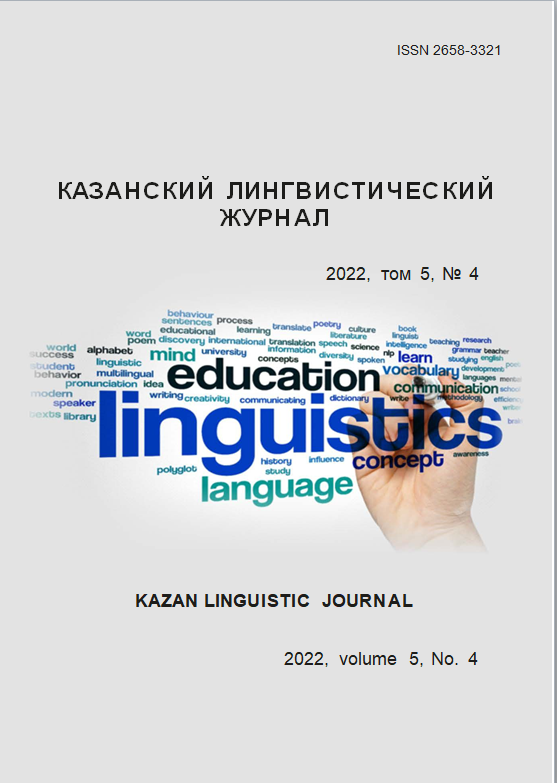Positive and Negative Factors of the Distance Learning Format of English Language Students of a Technological University
https://doi.org/10.26907/2658-3321.2022.5.4.451-461
Keywords:
English language, innovative technologies, distance learning, forms of education, students of a technological university, teachers of foreign languagesAbstract
The relevance of the presented work lies in the current social conditions not only in our country, but in the world, requiring a revision of the format of the organization and implementation of the educational process: the transition from full-time to a combined format - with the introduction of elements of innovative technologies, distance form of teaching disciplines. In this regard, the study of foreign languages in higher educational institutions has undergone a number of changes. Today, both teachers of foreign languages and the students themselves cannot imagine the educational process without the use of information and communication technologies. The article discusses the specifics of learning English in a technological university, provides positive characteristics that make it possible to increase the efficiency of the process under study; based on their own teaching experience, a list of shortcomings of the distance learning format is given, which reduce the success of students in mastering speech skills in the field of professional communication. The author provides an analysis of the prospects for leveling the negative factors of using innovative technologies in the process of teaching English, the problems of motivating students to speech activity, to a greater manifestation of independence and responsibility when performing practical tasks in the target language; the psychological barriers arising from the interaction of teachers and students at a distance are studied.
References
References
Kazakova U.A., Kuznetsova M.N. Formation of linguoculturological competence of stu-dents of a technological university. Traditions and innovations in teaching a foreign language. Ma-terials of the XI All-Russian Scientific and Practical Conference. Scientific ed. O.Yu. Makarova, comp. D.V. Gorbunov. Kazan, 2022: 63–69. Available from: https://elibrary.ru/download/elibrary_49198530_76392800.pdf [accessed: 02.10.2022].
Federal Law No. 273-FZ of December 29, 2012 (as amended on September 24, 2022) “On Education in the Russian Federation”. Available from: http://www.consultant.ru/document/cons_doc_LAW_140174/9ab9b85e5291f25d6986b5301ab79c23f0055ca4/ [accessed: 07.10.22].
Dreher R., Kondratyev V.V., Kazakova U.A., Kuznetsova M.N. New concept of Engi-neering Education for sustainable development of society. Advances in Intelligent Systems and Computing. 2021; 1329:819–831.
Dreher R., Kondratiev V.V., Kuznetsova M.N. “New” Enlightenment in the Digital Age? Engineering training in the use and formation of digital technologies. Management of sustainable development. 2021; 6(37):90–97.
Kuznetsova M.N. Features of the formation of a content component in the study of a for-eign language by students of non-linguistic universities (on the example of the English language). Kazan science. 2021; 3:87–89.
Dreher R., Kondratiev V.V., Kazakova U.A., Kuznetsova M.N. The concept of engineer-ing education for the sustainable development of society. Innovative technologies in transport and chemical engineering. materials of the XII International Scientific and Technical Conference of the Association of Mechanical Engineering Technologists. 2020: 191–195.
Kondratyev V.V., Kazakova U.A., Kuznetsova M.N. Development and implementation of the module “Engineering, Education and Pedagogy in Industry 4.0” in the structure of the curric-ulum “Innovative Pedagogy for Teachers of Engineering Universities” (IPET). Lecture Notes in Networks and Systems. 2022; 390 LNNS: 632–643.
Kazakova U.A., Kondratyev V.V., Kuznetsova M.N. Priorities of Vocational Training of Educators of Engineering Universities in the formation of their psychological and pedagogical competency. Lecture Notes in Networks and Systems. 2022; 390 LNNS: 644–653.
Kuznetsova M.N. Features of the application of the competence-based approach in the process of learning English by students of a technological university. Kazan science. 2020; 5:81–83.
Kuznetsova M.N., Kazakova U.A. The specifics of assessing the quality of the process of language training of students of technical universities. Kazan science. 2020; 1:84–86.
Kuznetsova M.N. The specifics of the motivation of students of a technological univer-sity to learn English through the content component of the educational material. Kazan science. 2020; 5:84–86.
Kuznetsova M.N., Kazakova U.A. Foreign languages as a means of social and profes-sional adaptation of higher school teachers to the international educational environment. The cate-gory of “social” in modern pedagogy and psychology. materials of the 7th All-Russian scientific-practical conference with remote and international participation. Rep. ed. A.Yu. Nagornov. 2019: 187–191.
Kuznetsova M.N., Kazakova U.A., Tubaltseva V.A. Verification criteria for the quality of the process of learning foreign languages by teachers of higher education (on the example of the English language). Kazan science. 2019; 12:111–114.
Kuznetsova M.N., Kazakova U.A., Tubaltseva V.A. English as a means of socio-professional adaptation of university teachers to the international educational environment. Kazan science. 2019; 6:76–79.
Alekhin I.A., Kazakova U.A., Kuznetsova M.N. Professional orientation as one of the factors in the formation of motivation for studying foreign languages by teachers of engineering universities. The world of education is education in the world. 2017; 1(65):36–42.
Alekhin I.A., Kazakova U.A., Kuznetsova M.N. Professional orientation as one of the factors in the formation of motivation for studying foreign languages by teachers of engineering universities. The world of education is education in the world. 2017; 4 (68): 44–50.
Khuseynov A.Z., Turchin G.D. Ya.A. Comenius is a classic of scientific pedagogy. Tu-torial. Saratov; 2015. 69 p.






